Busy Woman Refuses To Watch Her Ex's Dog So He Can Take Their Kid On A Vacation, Ex Trashes Her Excuse And Redditors React
Individuals who are ill or disabled, as well as those who care for them, can access a variety of local and national government support. Generally speaking, the level of assistance depends on the illness or whether the person is disabled.
The government offers a number of benefits to provide help and opportunities, and several departments and organizations manage them. If any of these benefits are due to you, you must apply for them in the proper manner.
As we pointed out earlier, individuals of working age, retirees, families with young children, persons with disabilities, and those who care for them can all receive benefits. Different departments or divisions of departments are responsible for each of these areas.
Making a claim in the proper location will ensure that you receive your benefit as soon as feasible. Also, child benefits are available to anyone with a child, just like the OP in today's story.
Families with specific needs, such as those with special needs children, single-parent families, expectant parents, and so on, can access additional support. The OP is fortunate to be paid every two weeks, and she claims benefits to help with rent and bill costs.
Her ex asked her to watch one of his dogs for three days while he took his family, including their five-year-old daughter, on vacation. The OP refused as she had to work, but her ex didn't accept her excuse.
Read the full story below.
The OP writes

The dogs pulled the OP so hard they ended up making her scratch her bare arm.

OP has offered the following explanation for why they think they might be the a-hole:
I told him no, and he won't accept it, so should I take the days off to watch the dog?
The Impact of Stress
Stress can significantly impact relational dynamics, often leading to miscommunication and conflict. According to a study by the American Psychological Association, increased stress levels are linked to heightened emotional reactivity.
Dr. Judith Orloff, a psychiatrist, emphasizes the importance of stress management techniques such as mindfulness and relaxation exercises. By regulating stress responses, individuals can communicate more effectively and approach conflicts with a clearer mindset.
We've gathered some of the topmost comments from other Redditors for you to read through below.

According to Dr. Ian Kerner, a renowned sex therapist, interpersonal conflict often arises from unmet expectations within relationships. He notes, "When partners have different priorities, it can lead to misunderstandings and resentment." This situation exemplifies how such differences can create tension. Furthermore, Dr. Michele Weiner-Davis, a marriage therapist, emphasizes that "effective communication is crucial to clarify expectations and foster mutual understanding," especially when one party feels unsupported, as this can exacerbate feelings of frustration and isolation.
Managing Expectations in Co-Parenting
The Redditor's refusal to watch her ex's dog reflects the complexities of co-parenting dynamics, particularly when expectations conflict.
Research in family psychology indicates that misunderstandings around responsibility often lead to resentment and conflict in co-parenting scenarios.
In fact, studies show that clear communication about expectations can significantly reduce tensions and improve outcomes for all involved.
Everything else is either a yes or a no with no explanation.
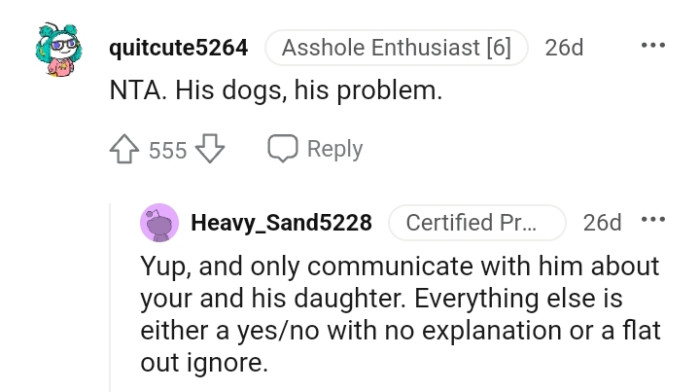
It's not the time to handle the ex's responsibilities.

It's not the OP's dog, so it's not her problem.
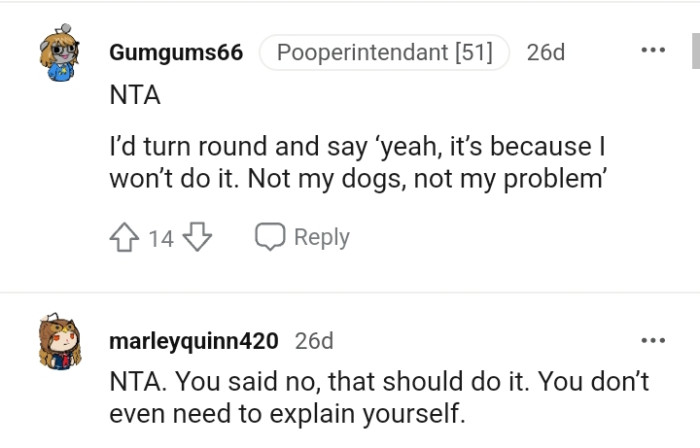
Coping with Rejection
Research from the University of California, Berkeley, shows that rejection sensitivity can profoundly affect emotional responses. Individuals with high rejection sensitivity often interpret neutral interactions as negative, leading to heightened anxiety and defensive behaviors.
Dr. Matthew Leary's work on self-esteem emphasizes that developing healthy coping strategies, such as cognitive reframing, can help mitigate the pain of perceived rejection. This approach encourages individuals to re-evaluate their thoughts and beliefs, fostering resilience in interpersonal conflicts.
A clinical psychologist specializing in family dynamics highlights that emotional dysregulation can arise when individuals feel their boundaries are being violated.
According to a study in the Journal of Family Psychology, emotional responses often stem from unmet needs and expectations, emphasizing the importance of articulating those needs clearly.
He is the OP's ex, so his animals are not her problem.

Leaving only one channel for written communication.
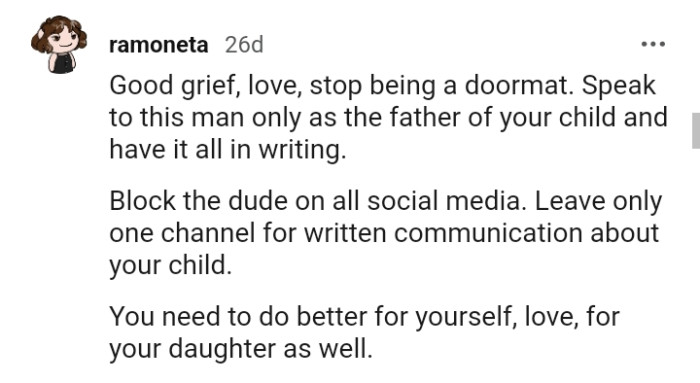
The OP doesn't owe him a reason for not doing him a favor.

A study published in the Journal of Social Psychology highlights the role of empathy in resolving conflicts. Effective conflict resolution requires an understanding of each other's perspectives, which can be challenging in emotionally charged situations.
Dr. John Gottman, a renowned relationship researcher, suggests that expressing empathy can significantly improve communication. Practicing active listening and validating each other's feelings can transform potentially divisive discussions into opportunities for growth and connection.
Effective Communication Strategies
To navigate these challenging interactions, employing effective communication strategies is essential.
Experts recommend using 'I' statements to express feelings and needs without triggering defensiveness, which can lead to more constructive dialogues.
Additionally, active listening can help validate the other person's feelings, fostering a more supportive environment for open communication.
He needs to go find a new solution, as NO is actually a full answer.
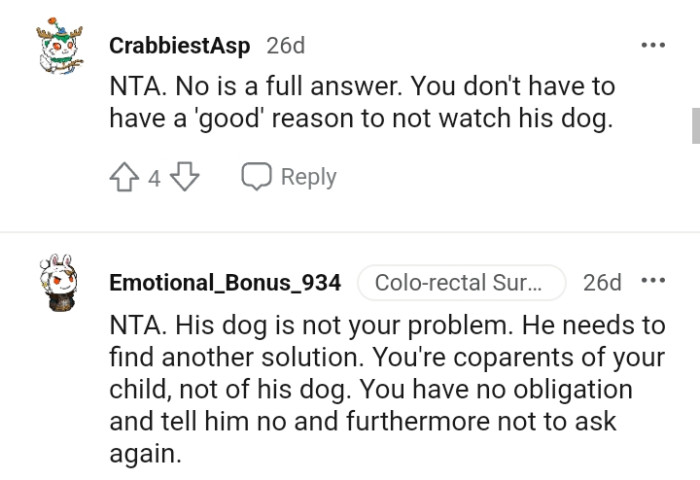
It's his dog, and it's his holiday, and it's his choice.
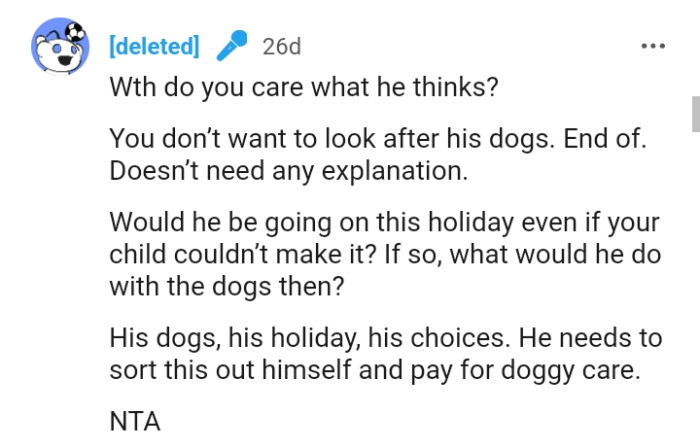
The OP should stop letting him make her feel guilty, as she owes him no explanation.

Setting Boundaries Effectively
Boundary-setting is crucial for maintaining mental health, especially in challenging interpersonal dynamics. Research indicates that individuals who set clear boundaries experience lower levels of stress and greater relationship satisfaction.
Psychologists recommend using 'I' statements to express feelings and needs without blaming the other party. For instance, saying, 'I feel overwhelmed when asked to help with the dog' can foster constructive dialogue while preserving personal agency.
Some Redditors pointed out that this is what they hate about some people. It’s the fact that they don’t realize that others are allowed to spend their own time how they want, so they can't just dump their own problems on other people.
Redditors supported the OP as she had valid reasons not to watch the dog, and you too can drop your own verdict in the comments section below.
Psychological Analysis
This situation illustrates the common challenges in co-parenting, particularly around expectations and responsibilities.
From a psychological perspective, addressing these issues through effective communication is crucial to maintaining healthy co-parenting relationships.
Analysis generated by AI
Analysis & Alternative Approaches
Understanding the psychological dynamics at play in co-parenting can facilitate healthier interactions.
By fostering clear communication and establishing boundaries, individuals can navigate these complexities more effectively, promoting cooperation and reducing conflict.
Psychological Analysis
The woman's refusal to watch her ex's dog could be seen as her setting boundaries and asserting her independence. She may feel she's already balancing multiple responsibilities and doesn't want to add another, especially one that isn't directly tied to her own commitments. It's a classic case of self-preservation and boundary-setting in psychology.
Analysis generated by AI
In understanding interpersonal conflicts, it's essential to recognize the psychological frameworks at play. Effective communication, boundary-setting, and empathy can transform challenging interactions into opportunities for growth. Research underscores that conflict resolution is not merely about winning an argument, but about fostering understanding and connection.
As Dr. Brené Brown notes, vulnerability is a strength that can lead to deeper relationships. By embracing vulnerability and practicing open dialogue, individuals can navigate complex emotional landscapes and cultivate healthier connections.



